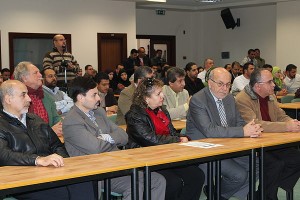 As a coordinator and grant holder, Birzeit University has recently launched “SIERA”, a project with a budget of half a million euros (funded by the EU FP7 program), in the field of multilingual and multicultural knowledge sharing technologies. The kick-off ceremony took place on the 24th of November 2011, and was in the presence of his excellency Dr. Mashhour Abu Dakka, the Minister of Telecommunication and Information Technology, Prof. Khalil Hindi, President of Birzeit University, Prof. Adnan Yahya, the Vice President for Academic affairs, Dr. Ali Jaber, Dean of the Faulty of Information Technology, and Dr. Mustafa Jarrar, the project coordinator. In addition, the kick-off ceremony was attended by a number of high ranking officials and European experts, as well as IT managers in Palestinian ministries and companies.
As a coordinator and grant holder, Birzeit University has recently launched “SIERA”, a project with a budget of half a million euros (funded by the EU FP7 program), in the field of multilingual and multicultural knowledge sharing technologies. The kick-off ceremony took place on the 24th of November 2011, and was in the presence of his excellency Dr. Mashhour Abu Dakka, the Minister of Telecommunication and Information Technology, Prof. Khalil Hindi, President of Birzeit University, Prof. Adnan Yahya, the Vice President for Academic affairs, Dr. Ali Jaber, Dean of the Faulty of Information Technology, and Dr. Mustafa Jarrar, the project coordinator. In addition, the kick-off ceremony was attended by a number of high ranking officials and European experts, as well as IT managers in Palestinian ministries and companies.
![]() Opening Ceremony
Opening Ceremony
His Excellency Dr. Mashhor Abudaka”, Minister of MTIT.
Prof. Adnan Yahya, Birzeit University
Dr. Ali Jaber, Birzeit University Dr. Mustafa Jarrar, Birzeit University
The objective of the SIERA project is to reinforce closer and sustainable scientific cooperation between Palestinian and EU scientists in the field of multilingual and multicultural knowledge sharing technologies. The project’s scientific scope is indeed timely, especially as the rapid growth of cross-border markets and global concerns are creating a huge demand to facilitate knowledge sharing between societies. In fact, the diversity of languages, cultures, and standards are the main barriers to sharing and consuming knowledge. Several European programs have prioritized joint research and development in this direction, especially integrating and exploiting multilingual and multicultural content and digital libraries. Although several challenges have been resolved in this direction, many remain open. As a result, reinforcing sustainable cooperation between the Arab and EU scientists is called for at this stage to integrate and extend Arab-EU research efforts in this scope. This is what SIERA aims to realize through its activities.
From his side, Prof. Yahya confirmed the importance and significance of the scientific scope of this project as it tackles many open research problems in the field of Arabic and multilingual knowledge sharing technologies and contributes to the development of the Palestinian software industry which is the main pillar of the economy. In addition, Prof. Yahya also noted that the importance of SIERA also comes from being the first FP7 project that Birzeit University coordinates (i.e., grant holder and coordinator). This indeed facilitates integrating the Palestinian academia into the worldwide research community, and opens opportunities for further cooperation in the near future; especially that one of the core objectives of SIERA is to build the capacity of the Palestinian researchers to facilitate their participation in future FP7 projects.
 Dr. Mashhour Abu Dakka has clarified that this project is considered a very important step in reinforcing the academic partnership with the EU, especially as it builds on other ongoing projects such as the EU TEMPUS project “Pal-Gov” that aims to establish the Palestinian e-Government Academy, as well as the Zinnar project which established the Palestinan e-Government Interoperability Framework. Dr. Abu Dakka also hoped that SIERA will accomplish exceptional results in contributing to the establishment of a Palestinian Software sector capable of competing on the regional and international levels. He also focused on the importance of SIERA in raising the level of the scientific competencies in the Palestinian society.
Dr. Mashhour Abu Dakka has clarified that this project is considered a very important step in reinforcing the academic partnership with the EU, especially as it builds on other ongoing projects such as the EU TEMPUS project “Pal-Gov” that aims to establish the Palestinian e-Government Academy, as well as the Zinnar project which established the Palestinan e-Government Interoperability Framework. Dr. Abu Dakka also hoped that SIERA will accomplish exceptional results in contributing to the establishment of a Palestinian Software sector capable of competing on the regional and international levels. He also focused on the importance of SIERA in raising the level of the scientific competencies in the Palestinian society.
Dr. Mustafa Jarrar, the coordinator of the project, elaborated on the goals and activities of the project, clarifying that Birzeit University will twin with four leading European research institutions that are pioneers in the area of multilingual knowledge sharing and have an excellent profile in research cooperation at the European and international levels. These institutes are: The New University of Lisbon in Portugal, Berlin-Brandenburg Academy of Sciences in Germany, University of Trento in Italy, and the University of Milano-Bicocca in Italy. Dr. Jarrar clarified that the collective expertise and scientific excellence of the consortium will be utilized to help Birzeit University enhance its research cooperation capacity. In particular, the project aims at achieving the following specific goals: (i) Widening the R&D strategy of BZU Sina Institute, (ii) setting up joint research and cooperation, (iii) facilitating PhD students co-supervision, where the project will provide four PhD scholarships, (iv) Organizing joint summer courses, and (v) building competency and facilitating the participation of Birzeit University in future FP7 projects.
It is worth mentioning here that two EU multilingual knowledge sharing portals have been selected as a concrete test-bed for establishing scientific collaboration and integration. The first, MICHAEL, is a cultural heritage portal which provides a multilingual service to explore digital collections from museums, archives, libraries and other cultural institutions from across Europe. The second, KYOTO, is a wiki-portal about environment and ecology. The key idea is to use them to investigate how to enable large-scale knowledge sharing portals with Arabic language and content. In doing this, a digitalized repository of Palestinian Cultural Heritage and another repository in the environment domain will be provided and added to the knowledge sharing portals. This will be done in cooperation with the project’s associate partners: the Palestinian Centre of Cultural Heritage Preservation, the Free University of Amsterdam, MICHAEL Cultural Heritage Association, the Egyptian Engineering Company for Developing Digital Systems (RDI), and the Palestinian Ministry of Telecommunication and Information Technology.

















